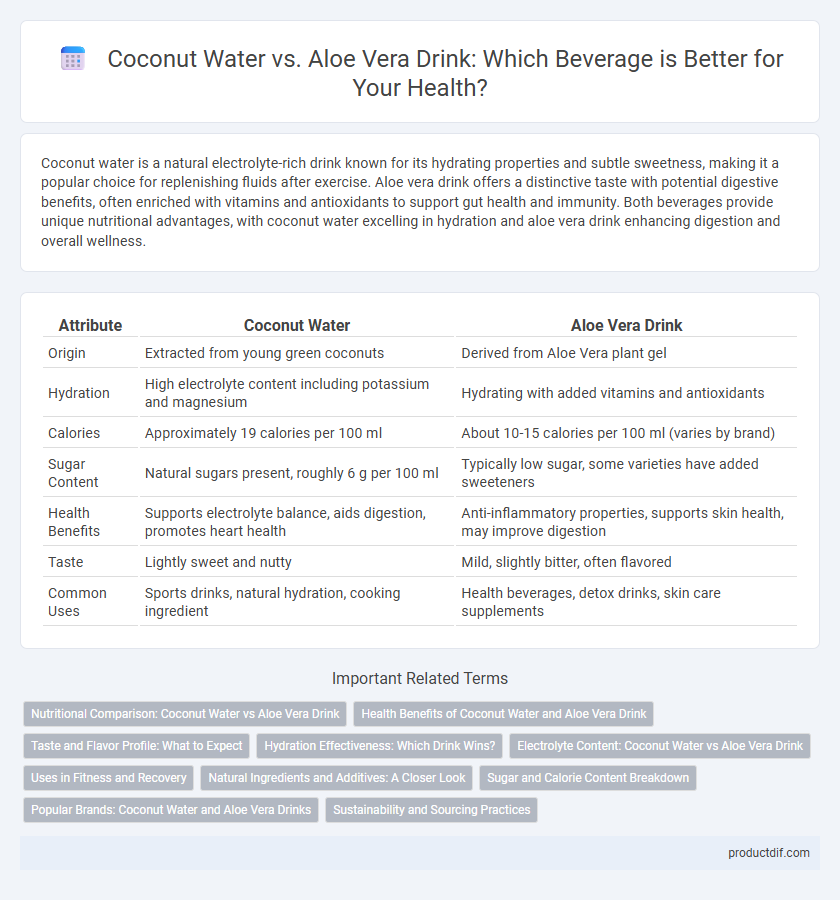Coconut water is a natural electrolyte-rich drink known for its hydrating properties and subtle sweetness, making it a popular choice for replenishing fluids after exercise. Aloe vera drink offers a distinctive taste with potential digestive benefits, often enriched with vitamins and antioxidants to support gut health and immunity. Both beverages provide unique nutritional advantages, with coconut water excelling in hydration and aloe vera drink enhancing digestion and overall wellness.
Table of Comparison
| Attribute | Coconut Water | Aloe Vera Drink |
|---|---|---|
| Origin | Extracted from young green coconuts | Derived from Aloe Vera plant gel |
| Hydration | High electrolyte content including potassium and magnesium | Hydrating with added vitamins and antioxidants |
| Calories | Approximately 19 calories per 100 ml | About 10-15 calories per 100 ml (varies by brand) |
| Sugar Content | Natural sugars present, roughly 6 g per 100 ml | Typically low sugar, some varieties have added sweeteners |
| Health Benefits | Supports electrolyte balance, aids digestion, promotes heart health | Anti-inflammatory properties, supports skin health, may improve digestion |
| Taste | Lightly sweet and nutty | Mild, slightly bitter, often flavored |
| Common Uses | Sports drinks, natural hydration, cooking ingredient | Health beverages, detox drinks, skin care supplements |
Nutritional Comparison: Coconut Water vs Aloe Vera Drink
Coconut water contains electrolytes like potassium, magnesium, and calcium, making it ideal for hydration and replenishing minerals after exercise. Aloe vera drink offers antioxidants, vitamins A, C, and E, along with digestive enzymes that support gut health and immune function. While coconut water is lower in calories and sugars, aloe vera drink provides added nutritional benefits related to digestion and skin health.
Health Benefits of Coconut Water and Aloe Vera Drink
Coconut water is rich in electrolytes like potassium, magnesium, and calcium, promoting hydration, supporting heart health, and aiding muscle function. Aloe vera drink contains antioxidants, vitamins A, C, and E, and anti-inflammatory properties that help improve digestion, boost the immune system, and support skin health. Both beverages provide essential nutrients, but coconut water excels in replenishing electrolytes, while aloe vera drink offers digestive and immune benefits.
Taste and Flavor Profile: What to Expect
Coconut water offers a naturally sweet and nutty flavor with a refreshing, slightly earthy undertone that is often described as crisp and hydrating. Aloe vera drink presents a mildly tangy and slightly bitter taste, complemented by a subtle herbal aroma and a gelatinous texture that some find soothing. Both beverages provide unique flavor profiles, with coconut water appealing to those who prefer a light sweetness, while aloe vera drink suits individuals seeking a more complex, medicinal flavor.
Hydration Effectiveness: Which Drink Wins?
Coconut water contains essential electrolytes like potassium, sodium, and magnesium, making it highly effective for rapid rehydration after exercise or heat exposure. Aloe vera drinks provide antioxidants and vitamins but often contain added sugars that may reduce hydration efficiency. For optimal hydration, especially during intense physical activity, coconut water generally outperforms aloe vera beverages due to its natural electrolyte balance.
Electrolyte Content: Coconut Water vs Aloe Vera Drink
Coconut water contains high levels of potassium, magnesium, and calcium, making it a potent natural electrolyte source ideal for hydration and muscle function. Aloe vera drink offers lower electrolyte content but includes essential vitamins and antioxidants that support digestion and immune health. For replenishing electrolytes quickly after physical activity, coconut water is more effective due to its rich mineral profile.
Uses in Fitness and Recovery
Coconut water provides essential electrolytes like potassium and magnesium, making it ideal for hydration and muscle recovery after intense workouts. Aloe vera drink contains antioxidants and anti-inflammatory compounds that support joint health and reduce exercise-induced inflammation. Both beverages aid fitness recovery, but coconut water excels in rehydration while aloe vera offers soothing benefits for muscle and tissue repair.
Natural Ingredients and Additives: A Closer Look
Coconut water is primarily derived from the clear liquid inside young coconuts and contains natural electrolytes like potassium and magnesium without added sugars or preservatives in pure forms. Aloe vera drinks often combine aloe extract with added sweeteners, stabilizers, and flavorings to enhance taste and shelf life, potentially reducing their natural purity. Evaluating labels for ingredient simplicity and absence of artificial additives helps identify the most natural option between these two beverages.
Sugar and Calorie Content Breakdown
Coconut water contains approximately 6 grams of natural sugar and 45 calories per 8-ounce serving, providing a hydrating option with moderate sweetness. Aloe vera drinks typically have lower sugar content, ranging from 2 to 5 grams per serving, and 20 to 30 calories, making them a lighter alternative for calorie-conscious consumers. Both beverages offer distinct hydration benefits, but coconut water generally contains more natural electrolytes like potassium while aloe vera provides antioxidants with fewer sugars.
Popular Brands: Coconut Water and Aloe Vera Drinks
Vita Coco and Harmless Harvest dominate the coconut water market with their natural hydration and electrolyte-rich profiles, appealing to health-conscious consumers. Aloe Vera drinks like OKF Aloe Vera King and Lily of the Desert offer soothing hydration combined with digestive benefits, often enhanced with natural fruit flavors. Both beverage types emphasize organic sourcing and minimal additives to meet growing demand for clean-label, functional drinks.
Sustainability and Sourcing Practices
Coconut water derives from coconuts grown primarily in tropical coastal regions, often benefiting from sustainable agroforestry practices that preserve biodiversity and improve soil health. Aloe vera drinks are sourced from succulent plants cultivated in arid environments, requiring significantly less water and pesticides, making them a water-efficient choice in sustainable agriculture. Both beverages emphasize ethical sourcing, but coconut water's impact varies with harvesting methods, while aloe vera demonstrates a lower environmental footprint due to its resilience in dry climates.
Coconut Water vs Aloe Vera Drink Infographic

 productdif.com
productdif.com